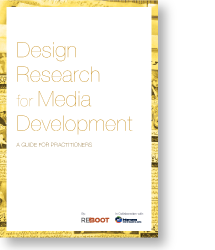Harnessing Design for Media Development in Pakistan
Access to reliable, locally relevant information is crucial for development. But in FATA, residents lack the information they need to live safer, more productive lives.
Decades of crisis have kept Pakistan’s Federally Administered Tribal Areas (FATA) in a perpetual state of instability, poverty, and isolation. In parts of FATA, a range of militant groups threaten regional security. US intelligence operations, attempting to defeat Taliban and Al-Qaeda militants, have targeted FATA with drones since 2004. For FATA’s residents, accurate and actionable information is critical for staying safe, but is exceedingly difficult to find. Mainstream media access is plagued by infrastructural shortcomings. The media that does reach the region is often heavily censored. Traditionally influential local sources of information, such as religious leaders, are also increasingly viewed with skepticism.
So we asked…
To design a locally relevant information service, we needed human insight into how FATA’s residents source, share, and evaluated the credibility of information. Through a design research investigation, we interacted with over 120 respondents across a range of urban, rural, and remote communities. They included farmers, journalists, housewives, politicians, taxi drivers, refugees, former militants, and religious leaders.
We learned that…
To overcome the great constraints of their information landscape, FATA’s residents rely on each other. They rigorously fact-check information through social networks. They visit spaces where information is shared, debated, and analyzed. They reach beyond borders through personal connections to get information from more credible media.
“We want to know how to get electricity and roads. We want to know how to get help from government offices. Where do we find this information?”
But while the social nature of information exchange in FATA is enabling, it is also limiting. Information passed from person to person introduces error and bias, placing residents even further from reliable sources.
And here’s what we’re doing about it…
We’re introducing “FATA Facts,” a design concept for reliable, locally relevant news and analysis, to encourage new thinking about how to better meet the information needs of FATA’s residents. FATA Facts sources questions from residents, which are then researched, analyzed, and responded to by a network of contributors drawn from FATA’s diaspora and youth populations. FATA Facts builds on the social nature of information exchange currently used by FATA’s residents, offering a template to development practitioners looking to design locally relevant programs.

